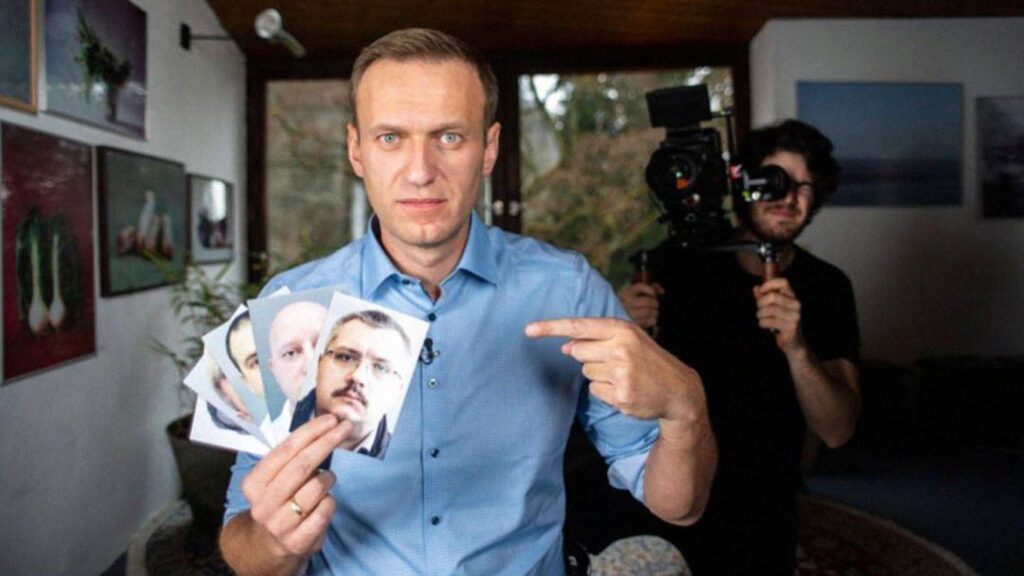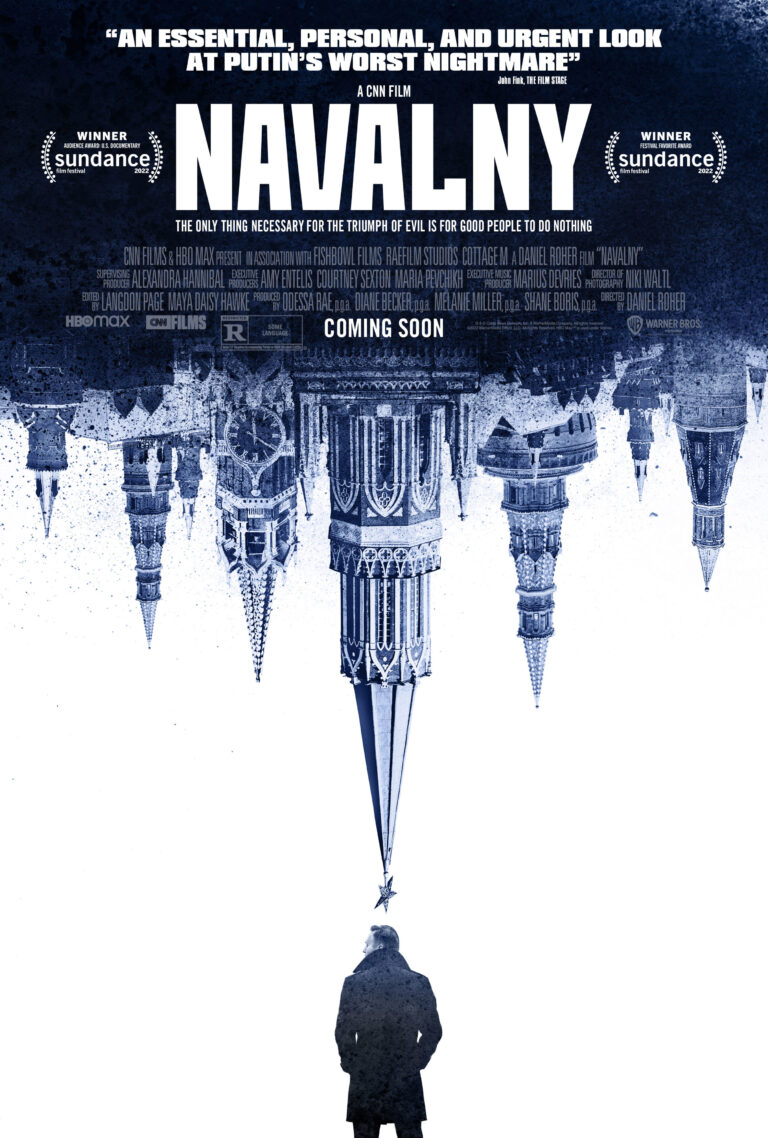Navalny – Snapshot
Navalny is a true political thriller that anyone interested in world events needs to see. But there are better documentaries, with less thrilling stories that deserve your attention too. (3.5*)
Where to Watch:
Stream: MAX
Rent: ???
Navalny – The Oscar Buzz
Oscar Nominations:
Documentary Feature Film (WINNER)
Navalny received a single nomination for Documentary Feature Film, putting it in our “special interest” list. And it won the Oscar!
Navalny – The Movie’s Family Tree
The Following Movies Share Talent with This One
(and if you like these films, you might like this one):
Once We’re Brothers (19) – Director (Roher)
Navalny is the product of filmmaker Daniel Roher, from the U.S. His previous documentary feature, listed above, is about Robbie Robertson and The Band. But I haven’t seen that or anything else Roher has done. (His earliest works date only to around 2014.) For Navalny he put together a team, but despite lengthy research, I couldn’t identify any linkages between key crew members – they are mostly younger people. So not much to go on in developing this film’s family tree.
Navalny – What Others Think
Navalny is one of those unusual documentaries where the viewing public actually rated the film higher than the critics, placing it first among the documentaries, seventh among all special interest films, and in the top third (tied with The Batman and Glass Onion) of all of this year’s films. What makes that even more interesting is the suggestion that Russian bots were used to downgrade the popular vote for the film. (I’m guessing that fans of the movie mounted a vote-often campaign of their own as a countermeasure.). Nonetheless, the movie plays like a crime thriller which is not standard documentary fare.
Critics liked the film, but not overly so, ranking it right in the middle of this year’s five documentaries. Nearly all the critics commented on aspects of the film being like a thriller. Ben Kenigsberg (New York Times) gave the film a Critics Pick noting “Mostly the movie is, as Navalny ordered, a thriller…”. Brian Tallerico (RogerEbert) commented that “Navalny and his team unraveled a conspiracy in a way that makes Navalny one of the most thrilling of the year.” And MaryAnn Johanson (FlickFilosopher ) calls it “As gripping, as suspenseful as a finely wrought fictional thriller…Films don’t get much more daring or crucial than this.”
The movie does indeed seem like a thriller but is that because the movie itself is constructed like one? Or is it because Roher managed to get himself smack dab in the middle of a most thrilling series of historical events? We have to remember that he didn’t manufacture these events – he didn’t write this screenplay – he only had the good luck to capture them. I will return to this observation below.
Navalny – Special Mention
Russia, Putin, and Navalny – As I did in last week’s review about India, All That Breathes, I was going to write a couple of paragraphs on Russia’s problems. But after thinking about it I realized that, especially with the War in Ukraine now part of Putin’s excesses, I couldn’t possibly explain enough to even start getting a grasp of the country. But there are a couple of things you need to know, although if you have any interest in this film, you probably already know them.
Alexei Navalny is a relatively young (born in 1976) man who has become, with the support of a small team, a real pain in the butt for Vladimir Putin. He runs an organization dedicated to fighting corruption in Russia and has, more than once, run for office at various levels in Russia, including as a direct opponent of Putin. Needless to say, he has never won. He broadcasts his corruption findings on social media, including a YouTube channel with more than six million subscribers. He has been convicted of embezzlement, although the trials weren’t considered fair. As the film documents, he was poisoned in August of 2020 and nearly died. The film’s history begins the story with that event and continues through to his courageous return to Russia five months later where he was arrested and jailed. His organization released a stunning video documenting Putin’s Palace, an absolutely outrageous, and very secret, estate Putin built himself, using unknown funds. That earned Navalny more prison time and in August of this year, the Russian court system added 19 additional years for “extremism”. It is no secret that Putin is very much afraid of this man and must keep him tightly controlled – he even refuses to mention his name.
Elements of a Good Documentary – This film illustrates one of the key problems in evaluating and criticizing documentaries and I’m going to talk about that more below. But I admit I’ve been struggling with this movie, and documentaries in general, because, while we all seem to understand that there are differences between documentaries and fictional films, it isn’t real clear how you can identify the differences in a critical review.
So I spent some time researching what other folks have said constitutes either the elements of a documentary, or what makes a good one. I found the following seven criteria on a web site for Desktop Documentaries:
- Tells a Story
- Director has Access
- Unique Characters who experience or react to a change
- Pulls the audience in throughout the film
- Sticks to one mode of storytelling
- Captivating cinematography and stands alone as a good movie
- Something to say that is bigger than the story itself.
Another site (imaffawards.com) lists the five essential elements as Exposition, Conflict, Rising Action, Climax, and Resolution (and how does that differ from a fictional movie?). And I found multiple other sites all trying to weigh in on how to make a good documentary.
But none of them were, for me at least, very satisfying. None of these lists actually seems to explain the difference between a fictional film and a documentary film. I will go into more detail below.
Navalny – Michael’s Moments
Navalny, is unquestionably a good film and if you haven’t seen it, you certainly should. As pointed out by others, it is an incredible thriller with an amazing story, terrific characters, and intriguing twists and turns. It ranks up there with some of the best political spy thrillers like a James Bond film. And the fact that it is all true and the antagonist is a world leader whose fingers are inches away from nuclear buttons – and is currently engaging in a baseless war against a neighboring country – means that it is also very relevant.
But the question I have to keep asking is how much do the filmmakers get credit for the greatness of this movie? For sure, Alexei Navalny is a unique man and demonstrates humor, courage, intelligence, and humility – he commands your attention, respect, and admiration. But he isn’t acting – that’s him, plain and simple. His wife and daughter demonstrate their love for him and their strength as a family. But those lines aren’t scripted – they are what they said and did and the cameras just happened to be there. The filmmakers can’t take any credit for their characters any more than they can claim that they wrote this incredible story. (Sometimes truth is stranger than fiction!)
There are some good filmmaking decisions in this movie. Roher doesn’t use the talking head approach to documentaries except as he interviews the subject himself, Alexei Navalny. The film opens with Navalny seated, not at a brightly lit desk or a sofa, ready for an interview. Instead he is sitting at a bar table. The bar does appear to be empty which is a little strange, and he doesn’t have a beer, but it is a bar. In the first question to Navalny, we get an answer that exposes all his qualities and seems to relax both the audience and the subject. Roher returns to the bar interview several times in the next hour of the film and we learn more about Navalny the man with each appearance.
Another thing Roher manages to do is to establish a remarkable degree of trust between Navalny and himself. It is that trust that allows Roher to film the historical moments that form the core of the film: the prank call that establishes with little doubt that it was indeed the Kremlin that ordered and planned the attempted murder.
There are two other key sequences in the drama and at least one of them is not Roher’s responsibility, although he obviously used it well. One is the sequence at the Omsk hospital, in Siberia, where Yulia, Navalny’s wife, is pleading for the doctors to release her husband. As I understand the sequence of events, Roher wasn’t involved in those early stages of the story, but it isn’t clear to me who filmed all of that. And it also isn’t clear that Roher’s team went to Russia with Navalny on that January, 2021 flight, so who filmed the airplane and customs sequences? I don’t know.
Roher does get credit for using all this remarkable footage well and for at least overseeing the editing that puts all of this together into a concise and intense package (but he isn’t listed as an editor so the actual credit may go to others!)
But Roher cannot get credit for the essential drama of this film! That belongs to Navalny, Putin, and history, and Roher luckily happened to be there! So if you are trying to critique this as a film, how do you separate out these contributions? Yes, the story is a thriller and the facts documented here are more than a little important to our current world situation, but is this really a better “film” than say A House Made of Splinters which managed to elicit heart wrenching stories from children as if the camera wasn’t even there, or All That Breathes that creates an impressionistic interplay between human “progress” and natural adaptations?
Interestingly, I had a similar issue with the Documentary Oscar Winner from four years ago Free Solo. While Alex Honnold’s no-rope climb up Half Dome was exciting and compelling drama, all the filmmakers did was record his ascent. Now granted, they had to position the cameras correctly and, at the same time, ascend the mountain face themselves (with ropes), but they were followers of the action, not active agents in the process. How much credit for an exhilarating visual experience do you give to the filmmakers when the real action, and risks, are taken by the subjects?
Obviously, I’m headed to an answer that minimizes the accolades for the filmmaker. And I would go even further and argue that the so-called “elements of a good documentary” websites haven’t hit the proper answer yet either. There is simply a difference between luckily intercepting history and creatively documenting reality.
You need to see Navalny, not because it is a good documentary but because it documents a very important historical sequence and the story is as dramatic and thrilling as it can get. See it and enjoy it, but, please, see some of the other documentaries mentioned above. There is a difference between being lucky enough to capture events and carefully crafting the story to tell. (3.5*)


